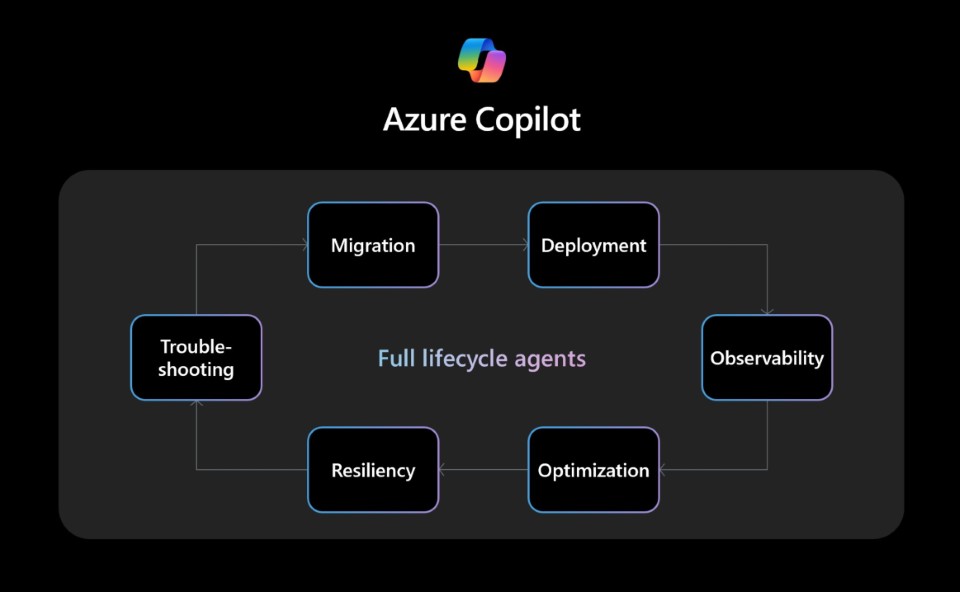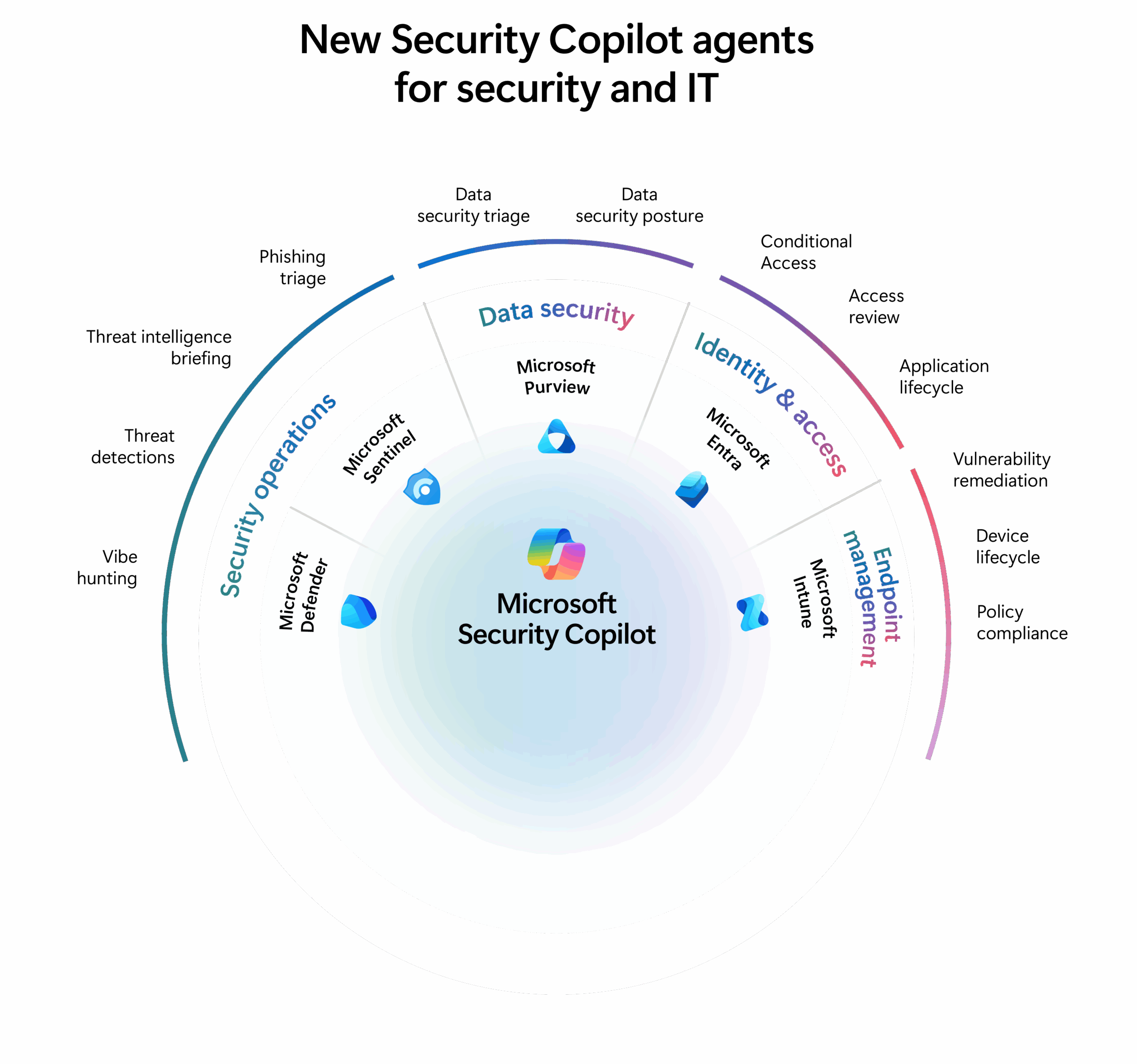At Microsoft Ignite 2025, one theme emerged with unmistakable clarity: agentic AI is moving into the enterprise mainstream. Microsoft framed this shift as the era of “Frontier firms”, the organizations leading the AI transformation by reshaping their operating models around it.
The announcements focused on enabling this transition, through AI agents and an intelligence layer for every business workflow, a more unified data foundation, and cloud capabilities built for safer agentic AI implementation.
In this blog, we break down the most relevant updates from Microsoft Ignite 2025, insights from technology leaders, and how Simform can help organizations put these innovations into action.
Key announcements from Microsoft Ignite 2025
Ignite 2025 introduced updates focused on the complete lifecycle of AI, with new tools, platforms, and capabilities designed to unlock higher productivity, automation, and innovation across the stack.
1. Advances in AI agents and the intelligence layer across Microsoft 365
A core theme was the shift from basic assistant Copilots to autonomous agents that can perform multi-step tasks and make decisions.
- Microsoft Agent 365: It provides a unified control plane to register agents, manage access, visualize agent behaviours, and enforce governance using tools like Defender, Entra, and Purview.

- Specialised Agents: Microsoft launched agents for specific functions, including a fully autonomous Sales Development Agent and three new agents to simplify workforce management. Admin Agents for Teams and SharePoint will automate routine IT and administrative tasks.
- Word, Excel, and PowerPoint Agents: Dedicated agents for the productivity apps can generate and refine documents, spreadsheets, and presentations. Powered by Work IQ, they pull context from files, meetings, and organizational data, while expanded Agent Mode enables in-app co-creation.
Microsoft also introduced updates across Power Platform, Copilot Studio, Dataverse, and Dynamics 365, ranging from automated agent testing to enabling richer context access via MCP. While a new offering for SMBs, Microsoft 365 Copilot Business, is launching in December, which brings agent-driven automation into everyday workflows to help smaller teams scale operations efficiently.
2. Azure AI Foundry becomes Microsoft Foundry with major upgrades
Microsoft has significantly expanded it into a unified platform for building, deploying, and governing enterprise AI agents. The latest updates introduce:
- Real-time business context to enrich agents
- Multimodal capabilities
- A catalog of MCP tools that allow agents to interact with business systems like SAP and Salesforce for custom business logic
- A universal context layer that combines intelligence across Work IQ, Fabric IQ, and Foundry IQ
Fabric IQ unifies all data with operational systems, while Foundry IQ is a fully managed knowledge system to ground AI agents. It includes a couple of other updates, like a new model router that optimizes performance and cost by automatically selecting the best model for each task.
Microsoft also announced the general availability of Azure DocumentDB, SQL Server 2025, and SQL database and Cosmos DB in Fabric, along with the preview of a newest addition, Azure HorizonDB.
3. New capabilities across Azure infrastructure and application services
Microsoft introduced several updates to make cloud modernization faster and improve performance on Azure, such as:
- Managed Instance on Azure App Service: provides a simplified path for migrating legacy .NET applications without major rewrites, helping organizations modernize critical systems more efficiently.
- Azure Copilot: updated with specialized agents embedded in the Azure portal and CLI, offering contextual support for everything from planning to troubleshooting. For instance, the Migration Agent guides teams through discovery and assessment, builds ROI-backed business cases, deploys landing zones aligned with governance standards, and orchestrates database and application modernization—all within a unified experience.

In addition, the Microsoft Marketplace is now globally available, giving organizations access to a broad ecosystem of cloud and AI solutions from partners.
4. Expanded security capabilities across cloud and AI workloads
Microsoft announced major enhancements focused on securing modern, AI-driven environments. Key updates include Security Copilot for all E5 customers at no additional cost and additional Microsoft 365 security updates like Baseline Security Mode and Agent Dashboard to quickly identify security vulnerabilities.

Microsoft expanded Security Copilot across its broader security stack, along with a unified Security Dashboard for AI that gives organizations visibility into AI posture and agent risks.
Microsoft Defender for Cloud has the most enhancements, including deeper GitHub Advanced Security integration, unified posture management across hybrid and multicloud environments, protection for serverless workloads, and new threat-hunting and mid-attack disruption capabilities. Together, these updates strengthen runtime protection for cloud-native and AI applications.
Insights from AI leaders at Ignite 2025
A major narrative reinforced at Ignite was the rise of Frontier Firms; the organizations that adopt AI early, embed it deeply into their operating models, and see outsized returns.
Microsoft and IDC released a global study that these early movers are already deploying AI across multiple business functions and are realizing up to 3x higher impact than slower adopters. Leaders agreed that this gap will widen as AI shifts from tooling to an operational capability that touches decisions, workflows, and customer experiences.
Beyond this study, several themes consistently emerged in conversations with technology, data, and AI leaders throughout the event:
- The shift from pilots to production is accelerating. AI experimentation is no longer the bottleneck; operationalizing AI at scale is. The priority now is making agentic systems reliable, governed, secure, and integrated with business processes. Organizations investing in custom AI solutions and domain-specific automation (sales, field workflows, supply chain, etc.) are moving fastest.
- Data foundations remain the biggest constraint. Despite rapid AI advancements, data quality, integration, and governance remain the primary blockers to fully leveraging agentic systems.
- Governance and risk management are now top priorities. As organizations begin deploying agents across departments, leaders emphasized the need for clear guardrails, visibility, and stronger controls for preventing “shadow agents.” This aligns with Microsoft’s push for Agent 365, Foundry Control Plane, and the broader security updates showcased at Ignite.
- Modern cloud architectures are now non-negotiable. To support AI workloads and multi-agent workflows, leaders stressed the importance of architectures capable of scaling elastically, integrating securely, and delivering real-time performance. Legacy systems continue to be the biggest drag on AI adoption speed.
- AI is becoming industry-specific, and the gap will widen. Competitive advantage is shifting from general-purpose AI adoption to deeply contextual, specialized AI. The IDC study shows that 67% of Frontier firms are monetizing industry-specific AI, with sectors such as finance, healthcare, and manufacturing leading the way.
Agentic AI might be the next differentiator. And as enterprises move toward multi-agent workflows, autonomous operations, and intelligent process orchestration, the conversation naturally shifts to how organizations can implement these capabilities in practice.
Simform at Ignite 2025
Simform participated at Ignite 2025 as a sponsor and exhibitor, engaging with customers, partners, and the broader Microsoft community throughout the week. Our team, including leadership from engineering, data, and solution architecture, met with organizations to discuss their priorities around AI adoption and modernization on Azure.
Enterprises are seeking faster yet reliable ways to move toward agentic architectures, modernized applications, and AI-ready data foundations. To support the shift, we showcased a set of our proprietary accelerators that are helping organizations on these fronts:
- ThoughtMesh (enterprise-wide agentic AI deployment framework): Helps enterprises consolidate knowledge assets, establish governed foundations for Copilot and agent deployments, and activate retrieval-augmented intelligence across the enterprise.
- NeuVantage (app and cloud modernization accelerator): Accelerates application and data modernization with structured assessments, business case modelling, automated code analysis, landing zone setup, and guided migration workflows aligned with Azure standards.
- TrueMorph (data platform modernization powered by AI): Helps enterprises modernize legacy data systems faster with automated assessments, improved pipeline reliability with self-healing capabilities, and a governed, AI-ready data architecture.
We also shared how we help customers strengthen their cloud and DevOps foundations, and and build the operational discipline required for enterprise AI. Beyond the Microsoft updates, our focus in on helping you think differently about what’s possible with Azure and agentic AI–and in a more scalable, governed, and value-driven way.
Leverage the latest Microsoft innovations with Simform
Ignite 2025 was a signpost for where enterprise technology is headed. The era of “desk-based apps plus dashboards” is giving way to agentic systems, workflow-centric automation, real-time data, and embedded AI.
At Simform, we believe that acting early, embedding deeply, and partnering smartly are the hallmarks of the frontier firm. We help you step into this new era by designing and deploying Azure-native agent frameworks, integrating them with governed data estates, and ensuring workflows run at scale.
Our approach is grounded in Well-Architected best practices. Thus, we help enterprises adopt Microsoft’s newest innovations, from Foundry to Agent 365, with clarity and confidence, and we compress time-to-value through structured accelerators.
Let’s build what’s next, together!
